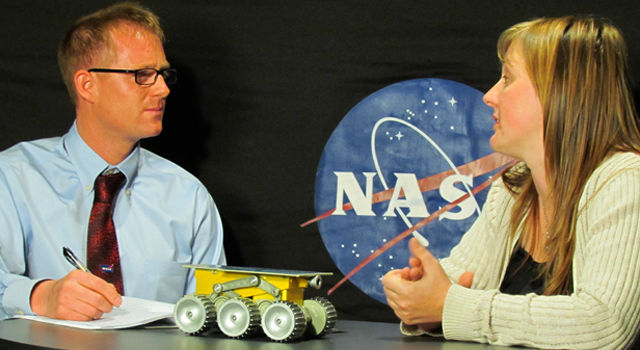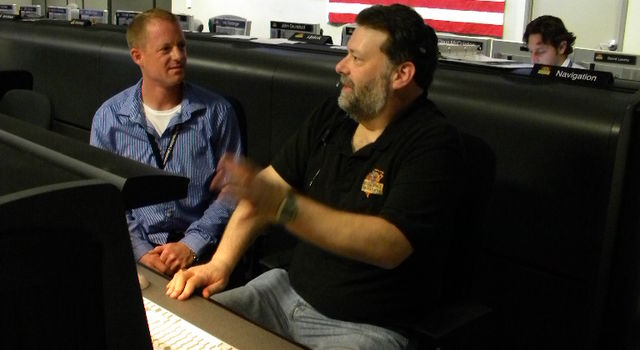Earth to Intern| December 7, 2012
A Chat with Todd Barber, Propulsion Engineer Meets Bear Grylls
There are certain people in life that exude such enthusiasm and passion, that you are helpless to escape their tractor beam of positivity. This summer, during my second internship at NASA's Jet Propulsion Laboratory in Pasadena, Calif., I was fortunate enough to meet and befriend just that kind of person. Todd Barber has such passion and talent for exploring and doing what humans do best: pushing the boundaries of what humankind is capable of. As the lead propulsion engineer for the Cassini spacecraft, he was at the controls for the tricky insertion of the spacecraft into Saturn's orbit and recently was at the helm for the cruise stage of the Mars Science Laboratory's Curiosity rover during its "seven minutes of terror" descent through the Martian atmosphere. As if that's not interesting enough, during his free time, he goes on math-based adventures, inspires students through NASA outreach activities and plays in at least two jazz bands. I caught up with Todd just days before he helped successfully land NASA's Curiosity rover on Mars to learn a bit about his path to success and how he inspires others.
How did you get to be the lead propulsion engineer for Cassini, one of my personal favorite missions?
"I started here 22 years ago. Often when they bring you in, they put you on mission operations, flying something, because you get to interface with all the other sub-system engineers and what they do, including thermal, power, communications, propulsion, essentially a boot camp. I started at JPL on the Galileo mission, doing mission ops. I loved mission ops so much, and I had a penchant for ops work. I think I'm a planetary science geek. The Voyager missions are what grabbed me. My way to contribute to planetary science is by being a propulsion engineer. I didn't know what missions I'd work on after Galileo, and luckily a Cassini engineer moved on. Six months before launch, they sought me out, and I've been on Cassini ever since. I get to work on other missions part-time, including the Mars Exploration Rovers, Deep Impact and a Mars airplane study."
"The Cassini job opened up, and my mentor, Dick Cowley, was the lead propulsion engineer at the time, but near retirement. He worked on Apollo -- the F1 engine -- so this guy was the propulsion guru. I picked his brain every day until he retired, and then one day, he said, 'I think it's time we make you the lead propulsion engineer.' This was a couple years before Saturn orbit insertion, and I had the privilege of presenting to the review boards, getting barbecued at the flight reviews. But all went smoothly and we had a marvelous orbit insertion, and now the Cassini spacecraft is still sending amazing images and data home every day. I like to say that if everything goes well, I'll be 51 years old after these missions and wonder what I'll do when I grow up, because I've been having so much fun on these outer planet missions!"
What exactly does a lead propulsion engineer for Cassini do?
"I am responsible for the health and safety of the propulsion system. We are like 'space plumbers.' All the engines, regulators, tanks, valves, we are responsible for all these systems. The Cassini propulsion system is the most complex propulsion system ever flown by JPL. It's a plumber's nightmare! My job also includes figuring out the gas mileage of the spacecraft -- bean counting the propellant, if you will -- and that is getting very important now as our monopropellant gas tank on the spacecraft is half full. (I'm an optimist.)"
What happens to Cassini when it runs out of its propellant?
"At the end of the mission, we will cross inside Saturn's rings, getting views and pictures we've never seen before, and then go out in a blaze of glory. On September 15, 2017, Cassini will be crushed and vaporized by Saturn's atmosphere."
Why not save the spacecraft?
"Actually, it's for astrobiological reasons. We would never want to accidently crash the spacecraft into Enceladus or Titan, two of Saturn's moons, and possibly contaminate them. Even though it's hard to imagine 'hearty spores' could have hitched a ride on the spacecraft from Earth that are just waiting for liquid water, we would never want that to happen before we can answer the most fundamental question, 'Did indigenous life start on its own?' It's called 'forward planetary protection.' The opposite is true as well, which is called 'backward planetary protection,' where if you bring things back to Earth from other planets, you would never want to bring back something that could wipe out humanity. We want to be as careful as we can."
Do you have to dodge asteroid belts, space junk, etc.?
"Yes. We have to worry about Saturn's ring plane, made up of dust and small particles. The rings are very thin, like a phonograph record, but huge across. There's a ton of dust and particles that make up the rings, and sometimes we have to turn the spacecraft around with the antenna facing forward, which acts as a giant dust shield. The dust can damage the engines, so we built a dust cover similar to a baby stroller sun shield that folds down. We've had to use it 70 times on the mission, and the engine is still working great! Our engine has a wonderful heritage, as it was the same reaction control thruster that carried Neil Armstrong and Buzz Aldrin on Apollo!"
Where do you think we should explore next?
"Well, I love the outer planets, I would love to work a Neptune orbiter and would love to go to Saturn's moons Titan and Enceladus, or Jupiter's moon Europa. There are very complex propulsion trajectories to get there, but the payoff could be huge!"
Were you an intern before you worked here at JPL?
"No, I was not. I actually interviewed here three times and got turned down twice. The third time was a charm. After getting turned down the first time after getting my undergrad in aerospace engineering, I went back and got my masters in aerospace engineering at MIT, and then I got my dream job. I remember the summer of my 8th grade year, I saw a National Geographic with the Voyager spacecraft flying by Jupiter and Saturn and was hooked. I said, 'I have to work there at JPL!'"
I know that you are very involved with NASA's educational outreach and are constantly inspiring and trying to get kids involved with NASA and JPL. What do you feel is the most vital thing we need to tell young people today to get them inspired?
"Well, I think the most vital thing is showing them that math and science are cool. Math and science are not generally thought of as cool, but when you see math and science in action at NASA, it's the coolest -- especially during our missions such as the Mars Science Laboratory. For the U.S. to stay competitive, I think we really need to focus on new innovation, for that's what made this country great!"
"I've had strange hobbies that have helped me apply math and science. One of my hobbies is 'confluence hunting,' basically geeks with GPS devices trying to find and visit integer (whole counting numbers) latitude and longitude intersections [across the globe]. There are 850 confluence points in the continental United States, and I visited 17 of the last 50. They gave me the nickname 'The Closer' on the website."
Do you think innovation is a learned trait, or something people are just naturally good at?
"I'm here because of great teachers. I'm the first to sing the praises of teachers who got me fired me up about math and science. I went to public schools and got really lucky that my teachers were world class and fired up on math and science, and I'm still in touch with them. They follow all my missions and tell the kids that I was once a former student of theirs and to shoot for the stars."
"I had two dreams as a kid, to work for NASA, and to compose music. I'm so happy that they both came true, and I feel like I have an explorer's spirit, and need to share that with others."
Speaking of music, I hear that you are in a Jazz band called "The Big Band Theory," and that you have a minor from MIT in music? Well, I play the classical violin, and I was wondering if we could jam sometime?
"Haha, absolutely! I'm in two bands, The Big Band Theory and The Jazz Propulsion Band, and I'm always playing music. Let's make that happen!"
TAGS: Todd Barber, Propulsion, Engineering, Cassini, Math









